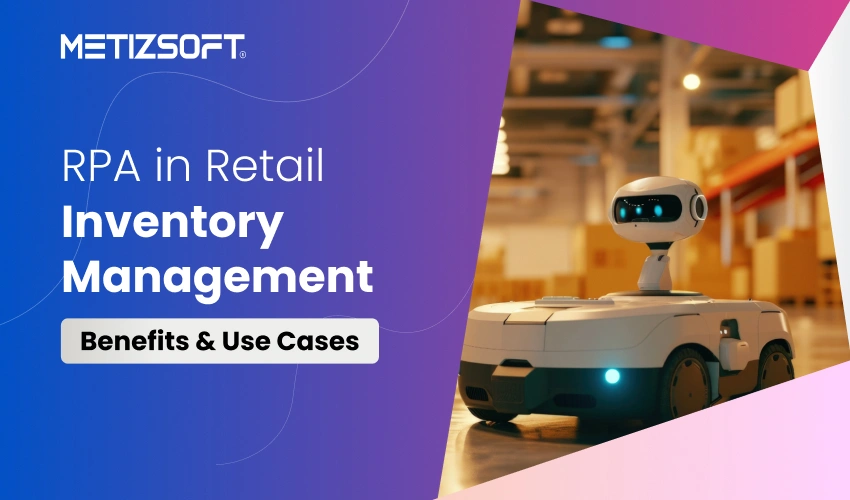
Managing retail inventory takes time and effort, regardless of size and capacity. It requires eagle-eye attention to data gathering from multiple resources and optimizing them to streamline the operation. The advancement in tech stacks has somehow reduced the burden.
However, the rapid business and supply chain growth has kept the struggle level high. Dealing with challenges is fundamental in business and crucial for success. It’s important to remember that we’re in an era of AI and automation revolution, giving us an edge with the latest tech.
F’e, Robotic Process Automation, aka RPA.
RPA in retail for inventory management is a concept that has been introduced previously. Many established and thriving business owners have already implemented and experienced RPA magic.
It’s a full-cycle solution, leading them to streamline their business operations with error-free inventory management.
This blog will explore the complete segment of RPA for Retail Inventory Management. We will discuss its role, use cases, and what benefits it has brought.
Table of Contents
Understanding Inventory Management in Retail
Balancing inventory in the retail industry is like performing an intricate dance to ensure your shelves are consistently filled with the products your customers desire while also avoiding the pitfall of ending up with a surplus of unsold items taking up space. This process revolves around carefully managing the quantity and placement of merchandise to meet demand when it arises.
Imagine a shoe store. It needs to have enough popular styles, sizes, and brands in stock to satisfy customers who walk in. But if too many are ordered, the company will be left with shoes that gather dust and tie up valuable cash. However, with effective inventory management, you will maintain the balance and extend customer retention.
RPA for Inventory Management in Retail
RPA in inventory management is like having a tireless and reliable assistant who keeps your stockroom running smoothly, frees up your staff, and gives you valuable insights to optimize your retail operations.
Imagine having a tireless worker who can automate repetitive inventory tasks, freeing up your staff for more strategic things. RPA in Inventory Management brings several benefits, such as:
Restocking on Autopilot: RPA can check inventory levels and automatically order more stock when levels are low. This helps prevent stock shortages and ensures that shelves are always full.
Deadstock Disposal: Are you ever faced with slow-selling items that seem stuck on your shelves? With the help of RPA (Robotic Process Automation) you can quickly identify these items and set up promotions or transfer them to other stores to clear them out faster.
Improved Inventory Visibility: Real-time data allows you to have up-to-the-minute information about your inventory, including knowing exactly what products are in stock, their locations, and when it’s time to reorder. This knowledge enables you to make more informed and timely decisions, ultimately improving your business operations.
Reducing Lead Time: Lead time is the duration between ordering goods and their arrival. Supply chain complexity affects lead time and business efficiency. RPA automates tasks such as data entry, stock tracking, reordering, supplier communication, invoice processing, and payments to reduce lead time.
Enhance Staff Agility: When repetitive tasks do not burden employees, they can dedicate their time and energy to providing superior customer service. It leads to greater customer satisfaction and the potential for increased sales.
RPA in Inventory Management Use Cases
RPA robots do more than monitor inventory, generate notifications, and transfer data. They can also leverage AI and machine learning to track patterns and prevent inventory shortages. Here’s a summary of unified RPA use cases in inventory management:
Automated Data Management: Retailers deal with data from different sources, such as cash registers, warehouses, and supplier systems. RPA bots can quickly move this data between systems, ensuring accurate and up-to-date inventory. This reduces manual data entry and errors.
Enhance the Supply Chain Visibility: Retailers that track orders throughout the supply chain can avoid inventory shortages and display accurate availability. Robotic Process Automation (RPA) software enables faster and more precise company communication. Real-time shipment status data from partners provides a better overview of delivery timing, allowing for coordinated activities.
Intelligent Reordering: Restocking is no longer based solely on intuition. Now, RPA can analyze past sales, consider seasonal trends, and automatically reorder when stock is low. This ensures that shelves are always stocked and prevents product shortages, which could result in lost sales.
Streamlined Supplier Communication: It’s crucial to maintain good relationships with suppliers. RPA can automate routine communication tasks like sending purchase orders, tracking deliveries, and flagging discrepancies or delays. This frees up staff time and ensures smoother supplier interactions.
Inventory Reporting and Analysis: RPA can excel at working with data. It can automatically generate reports on inventory levels, sales trends, and supplier performance. This gives retailers valuable insights to optimize inventory strategies, reduce costs, and make data-driven product assortment and pricing decisions.
How can Metizsoft help?
RPA in inventory is a complete revolution that seamlessly transformed retail industry functionalities and operations. It’s that digital assistant who works without getting tired and with utmost accuracy.
Implementing RPA in your retail ecosystem will streamline your entire operation and give you an edge over your competitors.
At Metizsoft, we feature an experienced and dedicated RPA development team that handles the entire implementation roadmap. If you want to Hire RPA Developers from a reliable RPA Development Agency, count us on!
AboutManthan Bhavsar
Related Posts
RPA in Manufacturing – Unveiling Role, Benefits & Use Cases!
The world isn’t just moving quickly but smartly with the ever-evolving tech stacks. For example, automation! Earlier,...
Top 10 Impactful Benefits of Robotic Process Automation (RPA)!
From a buzz/trend to real-time implementation, Robotic Process Automation (RPA) has quickly become the primary asset of...




